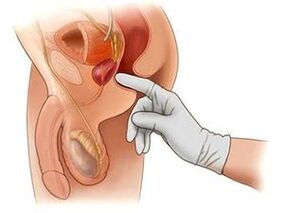Currently, the issue of defining prostatitis concerns more than half of men. Now we are talking about representatives of the stronger sex at the age of 30-35, but this number is declining, young people can also suffer from this disease. At the first sign, a urologist should be contacted and treated. To do this, it is important to know how to recognize prostatitis on your own.
Signs of acute form
In the acute form, it is quite easy to figure out how to identify prostatitis in men. In fact, it is an inflammatory process caused by complications after a common cold. This can be hypothermia, SARS or acute respiratory infections. It is a viral, fungal or bacterial infection that accidentally enters the prostate gland.

In this case, there are many symptoms of prostatitis - and it is easy for everyone to understand how to determine:
- The temperature is above 38 degrees.
- Nausea and vomiting due to poisoning.
- Cold and weak.
- Muscle pain.
- Unpleasant feeling in the lower abdomen.
- Pain while urinating.
- Small amount of blood in the urine.
- Violation of sexual function.
In this case, consult a specialist immediately. The main feature of the acute form is that it is quick and easy to handle. After treatment and recovery, the man can be sure to get rid of all the symptoms, including the normalization of sexual function.
Symptoms of chronic disease
The chronic form is somewhat more dangerous. In this case, the symptoms are more stable, long-term complex treatment is needed. Relapses can often occur even afterwards. You should see a doctor as soon as possible, there is hope for recovery only at an early stage. Symptoms include:
- The temperature rises to 37 degrees. This happens intermittently, not continuously.
- Frequent desire for the toilet. However, urination is disturbed, the beam is very weak.
- Pain symptom. The sacrum and scrotum can cause discomfort.
- Erectile dysfunction, sex life is significantly disrupted.
All of these symptoms greatly disturb any member of the stronger sex. Therefore, it is important to know in advance how to understand that you have prostatitis and take action.
Difference from other diseases
It is difficult to know the disease on your own. Symptoms may be similar for different diagnoses. Men suffer from problems with the urogenital system for several reasons. These may be common diseases:
- Orchitis and epididymitis cause testicular irritation. As a result, similar signs may occur and there may be acute pain when the scrotum is touched.
- Urethritis is accompanied by acute urinary tract pain, sometimes lowering the abdomen in complications.
- Cystitis is accompanied by a constant urge to go to the toilet and is often associated with urethritis.
- Pyelonephritis means kidney problems, back pain, and the presence of blood in the urine.
Many of the symptoms are really very similar. Therefore, prostatitis should only be determined by a specialist. The specialist will perform a full examination and select the individual treatment.
Professional diagnostics
Given that the symptoms may be similar to many other diagnoses, if any signs appear, consult a doctor and do not recover. The doctor should perform a comprehensive examination:
- Rectal palpation. Through the colon, the doctor will be able to feel the prostate, assess its condition and size.
- Cytology. A sample of prostate secretions is sent to a laboratory where the presence of various bacteria and infections is examined.
- Analysis of urine. Be sure to do this in a special way. To travel to a toilet, three cups are filled: at the beginning, end, and middle of urination.
- The ultrasound of the prostate is performed rectally, and the prostate and the surrounding area can be examined on the device.
- Rheography is performed with electrodes to measure the response of the prostate gland to irritation.
- Uroflowmetry examines urination problems. This applies to speed, duration and intervals between toilet runs.
Most men postpone seeing a doctor until the last stage. The test is really not very pleasant and embarrassing, but it is necessary to maintain health.
Often, even in a chronic advanced stage, no specialist can help solve the problems, the symptoms do not go away completely. It would be better to see a doctor once, have an examination, and be healed than suffer from erectile dysfunction and urinary tract problems all your life.





























